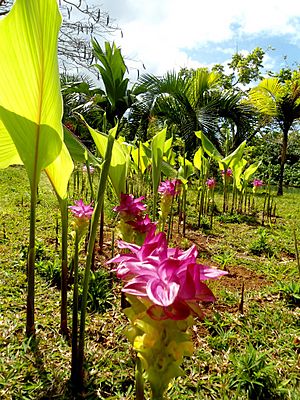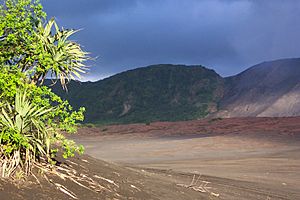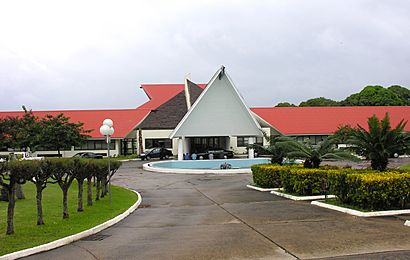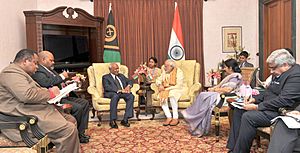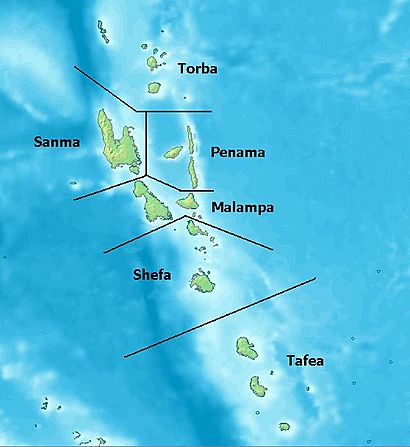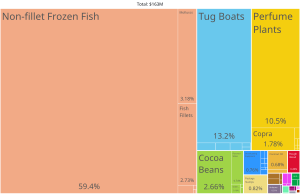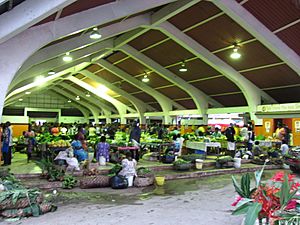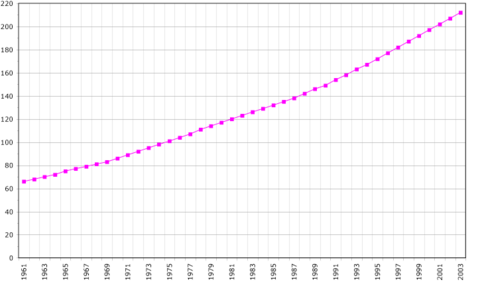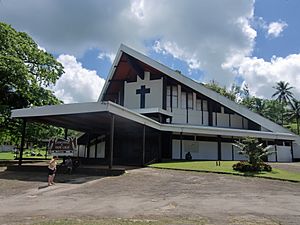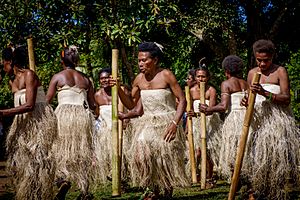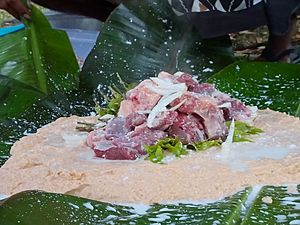Vanuatu facts for kids
Quick facts for kids
Republic of Vanuatu
|
|
|---|---|
|
|
|
|
Motto: "Long God yumi stanap" (Bislama)
Nous nous tenons devant Dieu (French) "With God we stand" |
|
|
Anthem: "Yumi, Yumi, Yumi" (Bislama)
"We, We, We" |
|
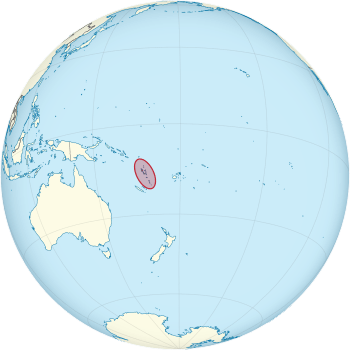 |
|
| Capital and largest city
|
Port Vila Lua error in Module:Coordinates at line 614: attempt to index field 'wikibase' (a nil value). |
| Official languages | |
| Ethnic groups
(2020)
|
|
| Religion
(2020)
|
|
| Demonym(s) | Ni-Vanuatu (or rarely: Vanuatuan) |
| Government | Unitary parliamentary republic |
| Nikenike Vurobaravu | |
| Charlot Salwai | |
| Legislature | Parliament |
| Independence | |
|
• from the United Kingdom and France
|
30 July 1980 |
|
• Admitted to the United Nations
|
15 September 1981 |
| Area | |
|
• Total
|
12,189 km2 (4,706 sq mi) (157th) |
| Population | |
|
• 2023 estimate
|
335,908 (182nd) |
|
• 2020 census
|
300,019 |
|
• Density
|
27.6/km2 (71.5/sq mi) (188th) |
| GDP (PPP) | 2023 estimate |
|
• Total
|
$1.002 billion |
|
• Per capita
|
$3,001 |
| GDP (nominal) | 2023 estimate |
|
• Total
|
$1.064 billion |
|
• Per capita
|
$3,188 |
| Gini (2019) | ▼ 32.3 medium |
| HDI (2022) | medium · 140th |
| Currency | Vatu (VUV) |
| Time zone | UTC+11 (VUT (Vanuatu Time)) |
| Driving side | right |
| Calling code | +678 |
| ISO 3166 code | VU |
| Internet TLD | .vu |
Vanuatu (VAH-noo-AH-too or van-WAH-too), officially the Republic of Vanuatu, is an island country in Melanesia. It is located in the South Pacific Ocean. This group of islands was formed by volcanoes. It lies about 1,750 km (1,087 mi) east of northern Australia. Vanuatu is also northeast of New Caledonia and west of Fiji.
The first people to live in Vanuatu were Melanesians. In 1606, a Spanish explorer named Pedro Fernandes de Queirós was the first European to visit the islands. He landed on the largest island, Espíritu Santo. He claimed the islands for Spain and named them La Austrialia del Espíritu Santo.
Later, in the 1880s, France and the United Kingdom claimed parts of the islands. In 1906, they decided to manage the islands together. This joint rule was called the New Hebrides Anglo-French Condominium.
In the 1970s, people in Vanuatu started a movement to become independent. The Republic of Vanuatu was created in 1980. Since then, Vanuatu has joined important international groups like the United Nations and the Commonwealth of Nations.
Contents
- What Does the Name Vanuatu Mean?
- Vanuatu's Past: A Journey Through Time
- Vanuatu's Geography: Islands, Volcanoes, and Nature
- How Vanuatu is Governed
- Vanuatu's Economy: How People Make a Living
- People and Culture of Vanuatu
- Learning and Education
- Vanuatu's Culture and Traditions
- Images for kids
- See Also
What Does the Name Vanuatu Mean?
The name Vanuatu comes from the word vanua, which means "land" or "home" in many local languages. It is combined with the word tu, meaning "to stand". So, together, Vanuatu means "our land stands" or "independent land". This shows that the country is free and stands on its own.
Vanuatu's Past: A Journey Through Time
Ancient History: First People and Chief Roy Mata
The early history of Vanuatu before Europeans arrived is not fully known. This is because there were no written records. However, scientists have found clues from old sites. These clues suggest that people first settled in Vanuatu about 3,000 years ago. These early settlers were likely from the Lapita culture. They brought crops like yam, taro, and bananas. They also brought animals like pigs and chickens.
One important story from this time is about a chief named Roy Mata. He lived around the 16th or 17th century. People say he brought different groups together and started a time of peace. Scientists have found old burial sites that match these stories. In 2008, the Lapita sites became Vanuatu's first UNESCO World Heritage Site.
European Explorers Arrive (1606–1906)
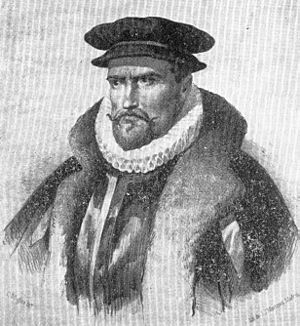
The first Europeans came to Vanuatu in 1606. It was a Portuguese explorer, Pedro Fernandes de Queirós, sailing for Spain. He landed on the island of Espíritu Santo. He thought he had found a large southern continent. He tried to set up a settlement, but it did not last long.
Europeans did not return until 1768, when French explorer Louis Antoine de Bougainville sailed past the islands. He named them the Great Cyclades. Then, in 1774, British explorer Captain James Cook explored the islands. He named them the New Hebrides, after islands near Scotland. This name was used until Vanuatu became independent in 1980.
In the 1800s, traders came looking for sandalwood, which was valuable. Later, plantation owners from Australia and other islands needed workers. Many Ni-Vanuatu people were taken to work on plantations in other countries. This period was called "blackbirding". Many people suffered from poor conditions and new diseases. Because of this, the population of Vanuatu decreased a lot.
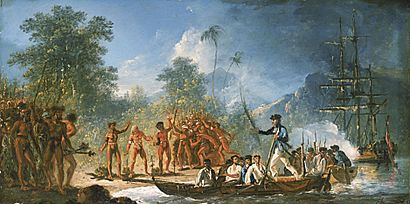
Missionaries also arrived from 1839 onwards, bringing Christianity. At first, they faced challenges, but many people eventually converted. European settlers also came to grow crops like cotton and coconuts. Over time, French settlers became more numerous than British settlers.
Becoming a Colony (1906–1980)
Because both France and Britain had interests in the islands, they decided to rule them together. This was called the Anglo-French Condominium, starting in 1906. It was a very unusual system with two separate governments, laws, and money systems. This made it hard to govern effectively. Ni-Vanuatu people were not allowed to become citizens of either country.
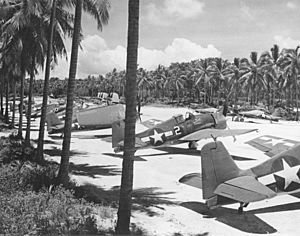
During World War II, the islands became very important. The United States sent many troops to Vanuatu. They built airstrips, roads, and military bases. The American soldiers were friendly and treated the local people with more respect than the colonial rulers. This changed how Ni-Vanuatu people viewed colonial rule. After the war, the Americans left, selling or dumping their equipment. This led to the rise of "cargo cults," where people hoped that goods would be delivered to them if they followed certain traditions.
The Road to Independence (1945–1980)
After World War II, many colonies around the world started to become independent. The Condominium government began to modernize Vanuatu. They built hospitals and schools. Ni-Vanuatu people slowly gained more power in the economy and churches.
However, local movements for independence grew stronger. Leaders like Jimmy Stevens and Walter Lini pushed for self-rule. Different groups had different ideas about how independence should happen. Some wanted it quickly, while others wanted a slower change.
In 1979, elections were held, and the Vanua'aku Pati (VP) won. Independence was set for July 30, 1980. Before independence, there were some tensions. On Espiritu Santo island, Jimmy Stevens and his supporters declared their own independent republic called Vemarana. British and French troops were sent in to help, but the situation was still difficult.
Vanuatu Today: An Independent Nation (1980–Present)
Vanuatu became independent on July 30, 1980. Walter Lini became the first Prime Minister. After independence, troops from Papua New Guinea helped to end the Vemarana rebellion. Jimmy Stevens was later jailed.
Since then, Vanuatu has been a peaceful country. Its politics have sometimes been unstable, with frequent changes in prime ministers. However, the democratic system has remained strong.
Vanuatu's Geography: Islands, Volcanoes, and Nature
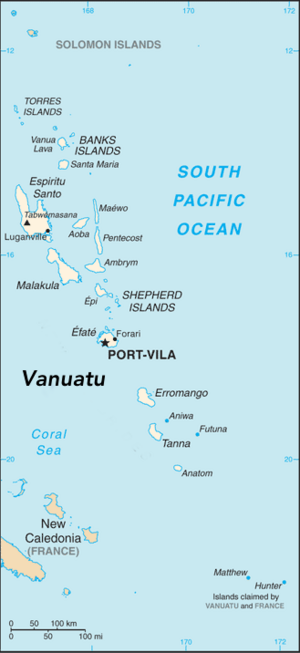
Vanuatu is made up of about 83 islands, most of which were formed by volcanoes. About 65 of these islands are inhabited. The islands stretch for about 1,300 km (808 mi) from north to south.
The largest islands include Espiritu Santo, Malakula, and Efate. The capital city, Port Vila, is on Efate. The highest point in Vanuatu is Mount Tabwemasana, which is 1,879 meters (6,165 ft) tall, on Espiritu Santo.
Most of the islands are steep, with not much flat land. Only about 9% of the land is used for farming. The coastlines are often rocky with coral reefs.
Vanuatu has several active volcanoes, like Lopevi and Mount Yasur. Volcanic activity is common, and there is always a chance of a major eruption. Vanuatu is known for its beautiful rain forests.
The growing population puts pressure on the land and resources. Fishing is very important, but too much fishing near villages can harm fish populations. Deforestation is also a concern, as forests are cleared for farming and cattle. This can lead to soil erosion. Vanuatu is working to protect its environment.
Plants and Animals of Vanuatu
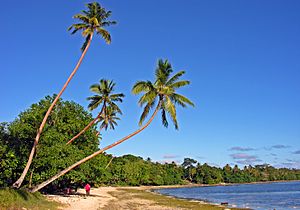
Even with its tropical forests, Vanuatu has fewer types of plants and animals on land compared to some other places. It has a special type of flying fox called Pteropus anetianus. These "fruit bats" are important because they help new trees grow by spreading seeds and pollinating flowers. There are no large native mammals.
Vanuatu has 19 types of native reptiles, including the flowerpot snake. There are also 11 types of bats and 61 types of land and water birds. The large Giant East African land snail arrived in the 1970s and has spread across the islands.
The waters around Vanuatu are full of sea life. There are over 4,000 types of marine molluscs and many different kinds of fish. Some sea creatures, like cone snails and stonefish, have poison that can be dangerous to humans.
Vanuatu's Climate: Warm, Wet, and Windy
The climate in Vanuatu is tropical. It has about nine months of warm, rainy weather and a chance of cyclones. The other three to four months are cooler and drier, with winds from the southeast. The water temperature is usually warm, ranging from 22°C (72°F) in winter to 28°C (82°F) in summer.
Vanuatu has a long rainy season, with a lot of rain almost every month. The wettest and hottest months are from December to April, which is also cyclone season. The driest months are from June to November. Vanuatu is one of the countries most at risk from natural disasters worldwide.
In 2023, Vanuatu and other island nations asked for a "Just Transition to a Fossil Fuel Free Pacific". They want to stop using fossil fuels and switch quickly to renewable energy.
Tropical Cyclones: Powerful Storms
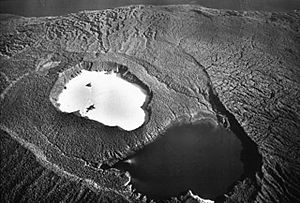
Vanuatu is often hit by strong tropical cyclones. In March 2015, Cyclone Pam was a very powerful storm that caused a lot of damage and some deaths across the islands. In April 2020, Cyclone Harold also caused great damage, especially in the town of Luganville on Espiritu Santo.
Earthquakes: Shaking the Islands
Vanuatu experiences earthquakes quite often. Many strong earthquakes have occurred over the years. These can sometimes cause damage to buildings and infrastructure.
How Vanuatu is Governed
Vanuatu is a parliamentary democracy. This means that people elect representatives to make laws. The country has a written constitution.
The head of the country is the President of Vanuatu. The President's role is mostly ceremonial, like a symbol of the nation's unity. The President is chosen for a five-year term by a special group called an electoral college.
The Prime Minister is the head of the government. The Prime Minister is chosen by the Parliament. The Prime Minister then picks a group of ministers to help run the country.
Vanuatu's Parliament has 52 members. They are elected by the people every four years. There is also a national Council of Chiefs, called the Malvatu Mauri. This council advises the government on matters related to Ni-Vanuatu culture and language. Chiefs are also very important leaders in villages.
Vanuatu's government and society are sometimes divided by language, between French and English speakers. This can make it tricky to form coalition governments.
The legal system in Vanuatu is based on both British and French laws. There are also village or island courts led by chiefs that deal with traditional laws.
Vanuatu's Friends Around the World
Vanuatu is a member of many international groups, including the United Nations, the Commonwealth of Nations, and the Pacific Islands Forum.
Countries like Australia, New Zealand, France, and the United Kingdom have provided help to Vanuatu. More recently, countries like the United States and China have also given aid and loans to help Vanuatu develop.
Vanuatu has strong ties with Australia, the European Union, the UK, and New Zealand.
Keeping the Peace: Vanuatu's Police Force
Vanuatu does not have a military in the usual sense. It has a police force called the Vanuatu Police Force (VPF). This force also includes a special paramilitary wing called the Vanuatu Mobile Force (VMF). These officers work to keep peace and order in the country.
How Vanuatu is Divided
Since 1994, Vanuatu has been divided into six provinces. The names of these provinces come from the first letters of the islands they include:
- Malampa (Malakula, Ambrym, Paama)
- Penama (Pentecost, Ambae, Maewo)
- Sanma (Santo, Malo)
- Shefa (Shepherds group, Efate)
- Tafea (Tanna, Aniwa, Futuna, Erromango, Aneityum)
- Torba (Torres Islands, Banks Islands)
Each province has its own local parliament, which helps manage local matters like tourism and basic services.
Vanuatu's Economy: How People Make a Living
The main ways people make a living in Vanuatu are through farming, tourism, financial services, and raising cattle.
Most people (65%) work in agriculture. They grow food for themselves and for export. Important crops include copra (dried coconut meat) and kava (a plant used to make a traditional drink). Farmers also grow cocoa and timber for export.
In 2018, Vanuatu banned all plastic bags and plastic straws to help protect the environment.
TourismTourism is very important for Vanuatu's economy. Many visitors come to explore the coral reefs and dive to see shipwrecks, like the SS President Coolidge. This ship sank during World War II and is one of the largest shipwrecks in the world that divers can explore. Vanuatu has also been a filming location for reality TV shows like Survivor: Vanuatu.
Financial services are also a key part of the economy. Vanuatu is known as a tax haven, which means it has very low or no taxes on income, capital gains, or inheritance. This attracts some international businesses.
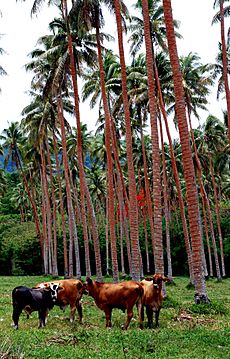
Raising cattle is important for beef production, which is exported. Pigs and chickens are also raised for food and play a role in local ceremonies.
Natural disasters like earthquakes and cyclones can affect Vanuatu's economy. A strong earthquake in 1999 caused a tsunami and left many people without homes. Another earthquake in 2002 damaged the capital, Port Vila.
People and Culture of Vanuatu
In 2009, Vanuatu had a population of 243,304 people. Most people live in rural areas, but the capital, Port Vila, and Luganville are larger towns.
The people of Vanuatu are called ni-Vanuatu. Most (98.5%) are of Melanesian descent. There are also smaller groups of Europeans, Asians, and other Pacific islanders.
In 2006, a study called the Happy Planet Index found that Vanuatu was one of the most "ecologically efficient" countries. This means it was good at achieving high well-being for its people while using fewer resources.
Languages Spoken in Vanuatu
Vanuatu has three official languages: Bislama, English, and French. Bislama is a creole that mixes Melanesian grammar with mostly English words. It is the common language used by most people across the islands.
Vanuatu is also special because it has over 100 different indigenous languages! This is the highest number of languages per person in the world. Each language is spoken by only about 2,000 people on average. All these local languages belong to the Austronesian language family.
Religions and Beliefs
Christianity is the main religion in Vanuatu. Many people belong to the Presbyterian Church in Vanuatu. Other common Christian groups include Roman Catholic and Anglican churches.
After World War II, some unique beliefs called "cargo cults" developed. People saw the many goods brought by American soldiers and hoped that by following certain traditions, similar "cargo" would be delivered to them. The John Frum cult on Tanna island is still active today. Also on Tanna, some villagers believe that the United Kingdom's Prince Philip was a divine figure. After he passed away, it is thought that their respect might shift to King Charles III.
Learning and Education
The ability to read and write (literacy rate) for young people aged 15–24 is about 74%. Most children go to primary school.
Vanuatu has campuses of the University of the South Pacific, which is a university shared by twelve Pacific countries. The campus in Port Vila, called Emalus Campus, has the university's law school.
Vanuatu's Culture and Traditions
Vanuatu's culture is very diverse, with different traditions in different regions. In the north, wealth is often shown by how much a person can give away. Pigs, especially those with curved tusks, are a symbol of wealth across Vanuatu.
Young men often go through special ceremonies to become adults. Most villages have a nakamal or village clubhouse. This is a meeting place for men, where they can also drink kava.
Music and Dance
Traditional music of Vanuatu is still strong in rural areas. Instruments often include drums, slit gongs, and stamping tubes. A popular type of music that grew in the 20th century is "string band" music. It uses guitars and ukuleles to play popular songs.
Modern music in urban areas includes genres like zouk and reggaeton.
Delicious Food
The food of Vanuatu (called aelan kakae) includes fish, root vegetables like taro and yam, and many fruits and vegetables. Most families grow their own food. Common fruits include papayas, pineapples, and mangoes. Coconut milk and cream are used in many dishes. Food is often cooked using hot stones, or by boiling and steaming.
The national dish of Vanuatu is called laplap.
Sports and Festivals
The most popular sport in Vanuatu is football.
The island of Pentecost is famous for a tradition called land diving, or gol. Men jump from a tall wooden tower with vines tied to their ankles. This is part of an annual yam harvest festival. This tradition is thought to have inspired the modern sport of bungee jumping.
Images for kids
See Also
 In Spanish: Vanuatu para niños
In Spanish: Vanuatu para niños
 | Isaac Myers |
 | D. Hamilton Jackson |
 | A. Philip Randolph |




